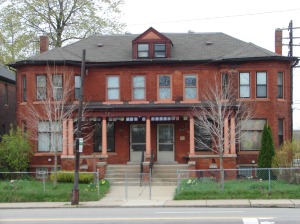I read a recent article by Melvin McLeod, editor-in-chief of Shambhala Sun, on the growing numbers of Americans who do not identify themselves as a member of any religion. He writes that the “spiritually but not religious” group of Americans are ” the fastest-growing demographic in the U.S. Generally, they’re educated, liberal, and open-minded, with a deep sense of connection to the Earth and a belief that there’s more to life than what appears on the surface.” Speaking to these Americans, he poses the question, “Is Buddhism the religion for those who don’t like religion?”
For me, the answer was yes.
My conversion to Zen Buddhism is not the exotic story of a white, suburban young man venturing across the globe and discovering a religious practice different from the Christian background he was brought up in. Rather, it is a mundane, simple story, despite the more than four decade gap between my being baptized as a baby in the Presbyterian church to taking the Precepts and being given the Buddhist name of DoHaeng.
Throughout my youth I walked the walk of a Christian. My parents took me to the Presbyterian church in Plymouth -where I grew up- almost every Sunday. I was an alter boy in my teens. When my sister and I were younger, we were enrolled in a neighborhood Lutheran church’s week-long summer vacation bible school where the biggest difference I noticed between the Presbyterian and Lutheran service was that one used the term “trespassers” and the other used “debtors” in the Lord’s Prayer.
But it occurred to me as I began high school that the God story was much like the Santa Claus story we were sold on as children. An all-seeing benevolent being was taking note of our deeds and misdeeds, which would determine whether we would receive a reward or not at a certain time. If there was no Santa Claus, then where was the proof that God existed?
That’s when I became an atheist.
In my early 20’s I began studying writing. I discovered Natalie Goldberg’s book, Writing Down the Bones. It is a writing book that does not focus on the usual categories of grammar, plot, characterization, etc., but on “using writing as your practice, as a way to help you penetrate your life and become sane.” Goldberg practiced Zen and referenced both writing and Zen practice throughout the book. This intrigued me and led me to my next softbound teacher, Taking the Path of Zen by Robert Aitken. What I found was that Zen provided something more useful than a mythical being judging us from the beyond as a guide to live one’s life. Zen helped peel away the layers of my mind in order to be more skillful in life.
But I lived in suburban Detroit where no Zen temples existed. I relied on books. For a period of seven years I attended a Unity church which exposed me to an interesting interpretation of Christianity. Human issues between the church’s board and their spiritual leader revealed to me that the “practical Christianity” it professed wasn’t very practical in practice.
In 2002, I found Still Point Zen Buddhist Temple on the same day they opened their doors. They had originally been holding services at a Unitarian church in Detroit. I had found my place. The practice and guidance of the founding teacher, P’arang, and current teacher, Koho, has advanced my practice more than two decades of book-learned Zen.
As I read McLeod’s article, he listed ten reasons why Buddhism enriches the path of the “spiritual but not religious.” These reasons, I realized, are what drew me to the Buddhist path and why Zen works for me. The reasons Mcleod gives are:
1. There is no Buddhist god.
2. It’s about your own basic goodness.
3. The problem is suffering. The answer is waking up.
4. The way to wake up is to work with your mind.
5. No one is there to “save” you, but you can do it.
6. There is a spiritual, non-material reality.
7. You don’t have to take anything on faith.
8. Buddhism offers a wealth of skillful means for different people’s needs.
9. It’s open, progressive, and non-institutional.
10. It works.
For the details of these reasons, McLeod’s article can be found HERE.
Many family and friends struggle with this conversion. It is okay. It’s about what works. For me, Zen provides more insight and guidance for daily living than anything else I’ve ever been exposed to.



